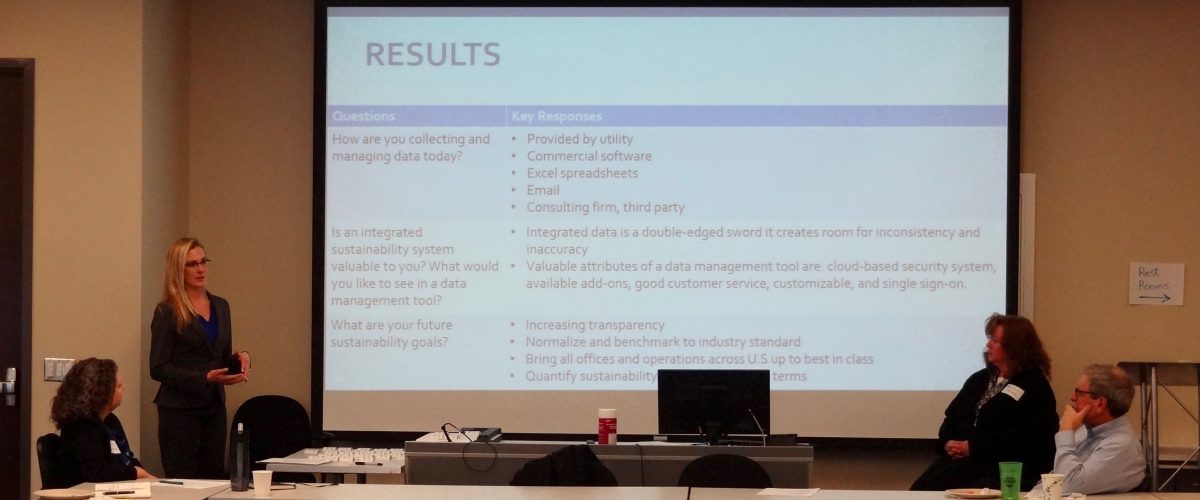
Current MBA student Christina Volpi recently shared her experience working for Sustainable Collaborations Group (SCG) with CU Denver Business School’s Managing for Sustainability Advisory Council. She spoke on her completed research on SCG’s Sustainability Performance Measurement software and shared her findings with the council.
SCG, a third party Sustainability Performance Measurement and Management services organization, has created software that gives clients an automated way to capture, maintain and manage sustainability activities, data, and information via an all-inclusive, integrated system. To do this, a template within the software was created, containing Key Performance Indicators (KPIs)–SCG wishes to expand this template. Before making modifications, however, Linda Moffat, SCG Founder, explained, “Market research is important before building or altering products or services and bringing them to market. Understanding the need, the target market and answering the simple question–will people buy/use this?–is vital. Without this step in the product creation process, time, money and resources can be wasted.”
To avoid the mistake of expanding the template in a vacuum, SCG hired Volpi to gather research through questions and discussions with sustainability executives. Volpi, who has previously interned for the Denver Zoo‘s sustainability program, was given the task of establishing placeholders for the information to be contained in the template such as operational data, data required for by GRI, and the Dow Jones Sustainability Index. Volpi also studied preferences, like what was most important to sustainability executives for their day-to-day activities, cross-functional team collaboration and decision-making. In addition, she also generated a wide variety of reports, including those which are released annually. SCG wanted to understand the challenges sustainability professionals face in collecting and maintaining this information.
To gain these insights, Volpi interviewed a number of sustainability professionals in various organizations. Here are the questions she asked, as well as the main findings of her research:
What is the most frustrating part of collecting, monitoring and managing data and information to help you and your organization with sustainability activities?
Having to report to different guidelines/performance measurements that require similar information in different formats is frustrating. People are non-responsive making it challenging to collect data; get accurate data and in timely manner. Data is disbursed and siloed.
What are you collecting, monitoring, managing, presenting and reporting on?
60% of the respondents use some portion of the GRI – Global Reporting Initiative Guidelines. 70% participate in the Dow Jones Sustainability Index. 70% provide information to the Carbon Disclosure Project. Only one organization has participated in the SASB – Sustainability Accounting Standards Board reporting. No one participates in B-Corp.
Where does your operational data/information reside and how do you collect it?
Emails, phone calls, Excel spreadsheets, Word docs, software applications – energy, water, etc.
If you could have this all accessible, usable, measurable and sharable in one place, would that be of value?
Results were a unanimous yes. A few already use software tools.
Commenting on the project, Volpi reflected, “Being able to speak with a variety of sustainability professionals was a valuable experience. I learned about what is important to these organizations and how they are promoting sustainability within their organizations.”
Volpi’s drive to be within the field of sustainability comes from a background in science and engineering. She hopes to incorporate business knowledge and strategy from her MBA to approach the assessment and resolution of environmental problems in a more strategic and comprehensive manner. Her ultimate career goal is to promote a sustainable relationship between growing human demand and a fragile environment, both natural and human.
“As a scientist, I have seen a frustrating disconnect between science and the general population,” Volpi stated. “I believe that with the broader knowledge base and understanding that a business degree will afford me, I will be able to bridge this gap and more effectively communicate science to the public and those in crucial decision-making roles.”
Since completing her time with SCG, Volpi has already found a new opportunity working part-time at the National Renewable Energy Laboratory (NREL) as a Renewable Energy Markets and Policy Analyst. Upon graduation, she hopes to turn this position into a full-time job.


